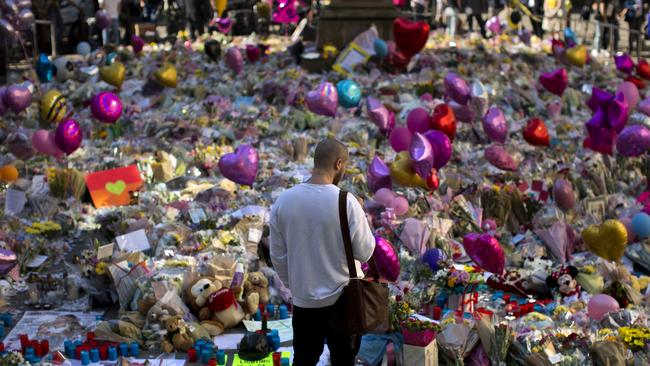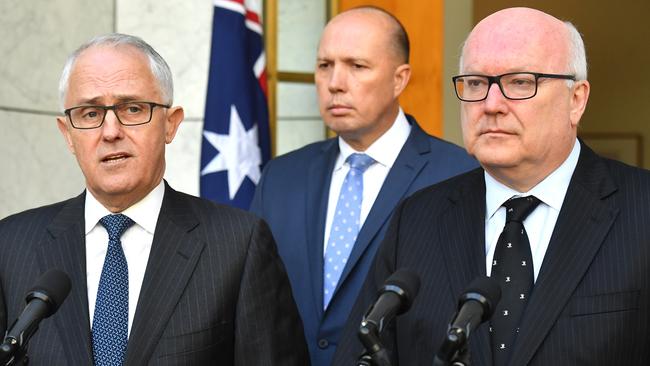Just look at the (Islamic) state we’re in

A government’s first duty is the defence of the nation and protection of its people. That is clear enough. After the shock of the devastating Islamic terror attack in Manchester and the news that the perpetrator was known to the authorities, one has to ask whether the government has done enough. Our security and intelligence agencies haven’t failed us — they act within the law and within the resources they have been given. It is the government that is responsible for our protection and defence; most of the time, they get it right. But this time, they failed. This atrocity could have been prevented.
So far, this and previous British governments and security services have been very successful in calming the nation in the aftermath of terrorist attacks. One of the secondary issues the government faces after a terror incident is to prevent revenge attacks and here, they have succeeded in the most part — good news on the one hand, but it prevents robust debate about the bigger issue. Of course, there is a danger that heightened reaction and comment to events such as the Manchester bombing can be seen as unhelpful, short sighted and something “that the terrorists want us to do”. Indeed, the red mist of anger can blur judgment. The rather milder, “keep calm and carry on” approach by the government and associated institutions is taken in the vain hope that it will finally bring an end to Islamic terror. There’s just one problem: it won’t. Indeed, it may make the situation much worse.
British politicians from across the political spectrum react in the same bland way after every attack: Threat levels are raised, anti-terror raids are carried out, the security and intelligence services go into, proposals are made for more mass surveillance of citizens, statements are made about how we will stand together as one community. Given Britain’s existing laws, and given that most politicians are moderate people, most of whom have lived in a stable, liberal and prosperous Western country this can only be expected. It is no different to how politicians have reacted across Europe every time another Islamist has attacked the Western way of life.
I’m afraid to say that such an approach has well and truly failed and we need to all realise this before the next attack. The funny thing is, the penny hasn’t dropped with the one set of people who could do something about it — our politicians. They’ll tell you that they are constrained by the law, constrained by limited resources, constrained by the determination not to make things worse. But they make the law, they allocate resources and they make policy. Perhaps they are just afraid of what to do. It feels like the Brexit debate all over again; politicians telling us what is in our best interest, what can or can’t be done inside the current law, how change to the current system, or over-reaction to events will just make things worse in the long run. Really? In the case of being blown to bits while going about one’s daily life, how much worse? Just as Britain’s politicians and “liberal elite” forgot that in 2016 there was a majority of people who felt, on balance, that the EU was taking our politics and democracy in the wrong direction, so they have not woken up to the reality that many people have recognised that the approach and policies to counter Islamic terrorism haven’t worked. These people, and I include myself, want demonstrable, lawful action, in the interests of everyone, (and it is crucial to understand that I mean everyone, of all faiths, including British Muslims). We want laws and policies that protect not just law abiding people, but our way of life — the way we live, feel and think: if you like, our “Christian based doctrine”, an idea that most of the time we are led to believe is something to be ashamed of. Not any more. Our unique British culture’s very survival is at stake.
We need more laws, resources and powers to deal with the threat of Islamic terrorism: better immigration control, more power and resources for the intelligence services, more control orders, possible intelligent internment and most importantly, a declaration that we are at war with Islamic terrorists, giving us the power to detain indefinitely those who wish us long term harm, and to deal with that threat. This is the first step in reassuring Britain that the government has the protection of its people at its heart. There is however, a much larger step two.
Islamic terrorists don’t appear out of nowhere. They have to get to a state of being that persuades them to take their own lives in the name of their delusional cause. They have to be indoctrinated into what is, in effect, a cult. Now comes the link to mainstream Islam. The indoctrination of young Islamic terrorists stems from extreme Islamic teaching and the hatred it has for the West. Above and beyond our religious beliefs, extremist preachers hate our culture, our laws of equality and human rights, our tolerance for the full spectrum of religious beliefs, our consumption of alcohol — the list could go on. This stance isn’t going to go away. Those who preach these extreme ideas believe everyone should convert to their way of thinking, an ideal that Christians of the West dropped over 100 years ago. The tragedy of successive British governments is that they have, with the best of intentions, and their belief in multiculturalism, misunderstood this underlying extremist intent within the UK. We also have the unanswerable question — what is the difference between extreme Islam, and a more moderate Islam that is in line with the other religions? I assume any Islamic preacher will say there is no such thing as extreme Islam, just Islam. So how do we cope with such a conundrum?
The problem for the West is that Islamic extremism and its teaching doesn’t have to be physically violent at every turn — in fact far from it — and herein lies the silent danger. The poisoned ideology it preaches in the name of God can remain hidden, yet grow for years within religious buildings, on the internet, inside prisons, or in the gathering of deluded minds. This extreme ideology, for now, remains within bounds of what is seen as acceptable in the eyes of British law, hidden under the banner of the right to religious beliefs, free speech and universal human rights. If Church of England vicars, Jewish rabbis or other religious leaders spoke with such hatred, and disdain for any other faith they would be prosecuted and silenced. Yet there is one religion in Britain today that has attained some sort of special status, and it is Islam. Fundamentally, many within it are opposed to change and we have been made to respect this, to not dare question its teachings. What is written is written, it’s “God’s Word”, it can’t be changed (a view of all but a minority of Muslims). This creates a problem for us in the West. We are all about managing change as we evolve as people and nations. The West’s culture and democracy is based, originally, on Christian teachings, not least the principle that we all have choices. In Islam, if you follow “what is written”, you don’t have any choice. What’s more, Islam is more than just a religion, it’s a culture and in many cases, a form of politics. When one’s way of life and the politics that govern a community are underpinned by a religion that won’t change, it won’t allow any adaptations to that culture — from how women are treated, to how young men and women behave before marriage, or what constitutes good behaviour (which doesn’t include attending a rock concert). It also won’t understand how sport and leisure are a major part of our lives, how the rights of minorities are protected or even how life is lived day to day. So how can this sector of society integrate? Is it any wonder that so many young Muslim men in the West get their initial grievance from not being able to integrate with our values?
But this subject is so sensitive, so toxic, that few dare to enter the debate. In Britain, “political correctness” and fear of offending the Pakistani Muslim community prevented the authorities from uncovering the biggest child abuse scandal in the country’s history. Likewise, we skirt around the issue of how to integrate Muslim communities into our way of life.
It’s up to the government to face this immense challenge head on. To put political and religious correctness aside and look to the country’s long term stability. It needs not only to introduce laws and policies that protect the population from Islamic terror groups, but to confront the ideology that allows these terror groups to build, recruit and deliver their warped vision of the world.
If our government fails to deliver, I fear for what is to come.
Colonel Harry Fullerton OBE, served in the British Armed Forces for 27 years and commanded the Household Cavalry Battle Group on combat operations in Northern Helmand Province, Afghanistan in 2009/10, at the height of the NATO campaign.



To join the conversation, please log in. Don't have an account? Register
Join the conversation, you are commenting as Logout